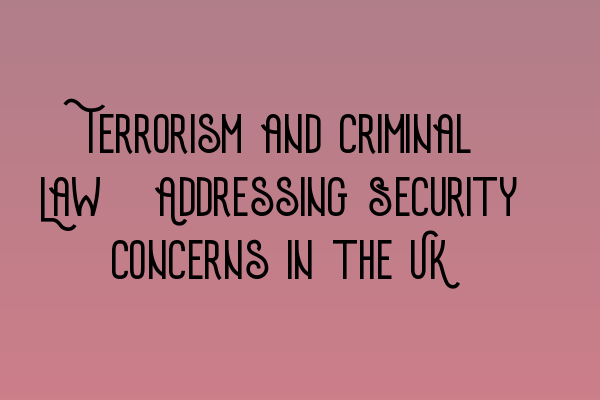Terrorism and Criminal Law: Addressing Security Concerns in the UK
As the world continues to grapple with the threat of terrorism, it is crucial for legal systems to have robust measures in place to address security concerns. In the United Kingdom (UK), terrorism is considered a serious criminal offense that poses significant threats to national security.
The Legal Framework
The UK has enacted a range of legislation to combat terrorism and ensure public safety. The Terrorism Act 2000, as amended by the Terrorism Act 2006, provides the legal foundation for addressing terrorist activities. Under this legislation, individuals can be charged with various offenses, such as preparing or instigating acts of terrorism, possessing items for terrorist purposes, or providing support to terrorist organizations.
In order to effectively prosecute these offenses, legal professionals must be well-versed in the intricacies of criminal law. Those aiming to become criminal law solicitors often undertake courses such as SQE 1 Preparation Courses and SQE 2 Preparation Courses to gain the necessary knowledge and skills to handle terrorism-related cases.
Challenges Faced
The ever-evolving nature of terrorism presents unique challenges to law enforcement agencies and legal professionals. From radicalization via online platforms to the use of encrypted communication channels, terrorists are constantly adapting their tactics to evade detection. This necessitates the continuous development of legal frameworks and strategies to effectively address these emerging threats.
Coordinated International Efforts
Terrorism is a global problem that requires international cooperation. The UK works closely with other countries to share intelligence, coordinate investigations, and extradite individuals involved in terrorist activities. The fight against terrorism is not confined to national borders but requires a unified effort to disrupt and dismantle terrorist networks.
SRA SQE Exam and Expertise
Legal professionals seeking to specialize in criminal law, with a focus on terrorism cases, need to pass the Solicitors Qualifying Examination (SQE). The SQE tests candidates’ knowledge and skills in various areas of law, including criminal law and practice. To excel in these exams, candidates often utilize resources like SQE 1 Practice Exam Questions and SQE 1 Practice Mocks FLK1 FLK2 to familiarize themselves with the exam format and content.
By passing the SQE and gaining expertise in criminal law, solicitors can provide essential legal support to counter-terrorism efforts in the UK. Their knowledge of relevant legislation, court procedures, and case precedents allows them to navigate complex terrorism-related cases with precision and professionalism.
Conclusion
Terrorism remains a significant security concern in the UK, and criminal law plays a crucial role in addressing this threat. Legal professionals specializing in criminal law have a vital responsibility to protect national security, while upholding civil liberties and ensuring fair trials. Through their expertise and dedication, they contribute to the ongoing fight against terrorism.
To learn more about the SQE exams or to access practice resources, please visit the following links:
- SQE 1 Practice Exam Questions
- SQE 1 Practice Mocks FLK1 FLK2
- SQE 2 Preparation Courses
- SQE 1 Preparation Courses
- SRA SQE Exam Dates
